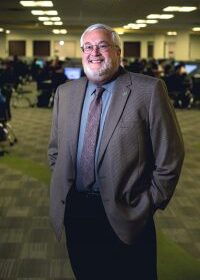Film screening event calls for education equality, end to persecution

Because the majority of the free world prides itself on providing education to a diverse array of people regardless of religious beliefs or nationality, it may come as a surprise to USF students that in Iran, the country’s largest
religious minority has been stripped of its right to an education.
“To Light a Candle” documents the story of the Baha’is, who have resorted to teaching themselves via a series of covert classrooms installed in homes, through the mail and by using online lectures in response to state-sponsored repression.
The film, directed by Iranian-Canadian journalist Maziar Bahari, will be shown tonight at 7 in the Dr. Kiran C. Patel Center for Global Solutions. The film screening coincides with the launch of the international “Education is Not a Crime” campaign.
“An attack on education somewhere is an attack on education everywhere,” said John Pilz, a USF senior majoring in environmental science and policy. “Education is not a crime. Education is a human right.”
Pilz helped organize the event after watching the documentary. He collaborated with USF World and student organizations to hold the screening.
“People are being denied fundamental human rights,” Pilz said. “Maziar Bahari was inspired to make a movie and put it on the Internet. When I watched the trailer, I really was inspired to do something of my own at university, so I said to myself, ‘I have the time so why not?’”
The film neatly corresponds to the mission set by the “Education is Not a Crime” campaign, which is being endorsed by several renowned scholars and prominent figures, including anti-apartheid activist Archbishop Desmond Tutu.
The Islamic Revolution of 1979 altered the lives of Iranian Baha’i citizens by forbidding them from pursuing an education or teaching in a university setting. In response, the community established the Baha’i Institute for Higher Education (BIHE) in 1987.
BIHE works to achieve equality in education and eradicate the threat of the violent opposition that has forced them to pursue education in secret. If an
unapproved classroom is discovered, the teachers and students can be arrested.
Sepideh Eskandari, a Baha’i lawyer born in Iran, will serve on a panel of experts to answer questions after the screening. Eskandari was able to acquire an education without persecution in the U.S. She blames the “sheer ignorance” of the Iranian government for the plight faced by the Baha’is.
Today, a passion for education and humanity is what drives the Baha’is to continue schooling themselves in secrecy. Eskandari said the Baha’is have no interest in interfering with the religion of others.
“Our perpetual religion is to service the world of humanity, regardless of nationality or
religious background,” she said. “That shouldn’t even be an issue. Our purpose in the world is to support one another.”
Parts of the film had to be smuggled out of Iran to reach the public eye. Although the film focuses on the challenges facing the Baha’is, its message is universal in scope: education is a fundamental right.
“We are here pulling for an education, something that we know to be a right given to us,” Pilz said. “Some are here because of family, others because of work, but we all hold the common right to an education.”
A selection from the writings of Abdu’l-Baha, the eldest son of Baha’i founder Baha’u’llah, states, “If others hurl their darts against you, offer them milk and honey in return; if they poison your lives, sweeten their souls.”
Eskandari said she hopes the future of Baha’i students will be a free one.
“Let’s hope that the Iranian Baha’i students, getting an illegal education, can receive amnesty from wonderful institutions like USF,” she said. “Let’s hope they can be welcomed to apply to be educated where they are more than welcome to study.”
Eskandari also anticipates the film will alert USF students to the injustices faced by the Baha’is on a daily basis — an injustice fueled by a hate the Baha’is refuse to reciprocate.
“It’s none of my business, someone else’s salvation,” she said. “It’s not my business to focus on other people and forget my own salvation.”






